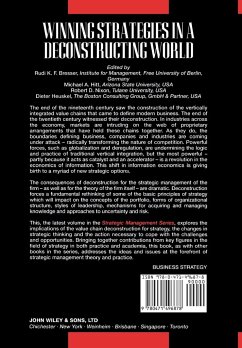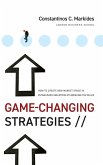Rudi K. F. Bresser / Michael A. Hitt / Robert D. Nixon / Dieter Heuskel (Hgg.)
Winning Strategies in a Deconstructing World
Herausgegeben:Bresser, Rudi K. F.; Hitt, Michael A.; Nixon, Robert D.; Heuskel, Dieter
Rudi K. F. Bresser / Michael A. Hitt / Robert D. Nixon / Dieter Heuskel (Hgg.)
Winning Strategies in a Deconstructing World
Herausgegeben:Bresser, Rudi K. F.; Hitt, Michael A.; Nixon, Robert D.; Heuskel, Dieter
- Gebundenes Buch
- Merkliste
- Auf die Merkliste
- Bewerten Bewerten
- Teilen
- Produkt teilen
- Produkterinnerung
- Produkterinnerung
Das Ende des 19. Jahrhunderts sah den Aufbau der vertikal integrierten Wertkette - der Inbegriff des modernen Unternehmens -, und das Ende des 20. Jahrhunderts ist Zeuge ihres Abbaus. Dieser Abbau hat für das strategische Management eines Unternehmens gravierende Auswirkungen. Dieses Buch - der neueste Band der Reihe 'Strategic Management Series' - untersucht, welche Auswirkungen der Abbau der Wertkette auf die Unternehmensstrategie hat, wie sich das strategische Denken verändert und welche Maßnahmen notwendig sind, um mit den daraus resultierenden Herausforderungen und Chancen umzugehen.…mehr
Andere Kunden interessierten sich auch für
![Managing Strategically in an Interconnected World Managing Strategically in an Interconnected World]() Michael A. Hitt / Joan E. Ricart I Costa / Robert D. Nixon (Hgg.)Managing Strategically in an Interconnected World160,99 €
Michael A. Hitt / Joan E. Ricart I Costa / Robert D. Nixon (Hgg.)Managing Strategically in an Interconnected World160,99 €![New Managerial Mindsets New Managerial Mindsets]() Michael A. Hitt / Joan E. Ricart I Costa / Robert D. Nixon (Hgg.)New Managerial Mindsets160,99 €
Michael A. Hitt / Joan E. Ricart I Costa / Robert D. Nixon (Hgg.)New Managerial Mindsets160,99 €![Developing Business Strategies Developing Business Strategies]() David A. AakerDeveloping Business Strategies51,99 €
David A. AakerDeveloping Business Strategies51,99 €![Game-Changing Strategies Game-Changing Strategies]() Constantinos C. MarkidesGame-Changing Strategies23,99 €
Constantinos C. MarkidesGame-Changing Strategies23,99 €![Winning the War for Talent Winning the War for Talent]() Mandy JohnsonWinning the War for Talent21,99 €
Mandy JohnsonWinning the War for Talent21,99 €![Winning Across Global Markets Winning Across Global Markets]() Dan SteinbockWinning Across Global Markets21,99 €
Dan SteinbockWinning Across Global Markets21,99 €![Art of the Long View Art of the Long View]() Peter SchwartzArt of the Long View26,99 €
Peter SchwartzArt of the Long View26,99 €-
-
-
Das Ende des 19. Jahrhunderts sah den Aufbau der vertikal integrierten Wertkette - der Inbegriff des modernen Unternehmens -, und das Ende des 20. Jahrhunderts ist Zeuge ihres Abbaus. Dieser Abbau hat für das strategische Management eines Unternehmens gravierende Auswirkungen. Dieses Buch - der neueste Band der Reihe 'Strategic Management Series' - untersucht, welche Auswirkungen der Abbau der Wertkette auf die Unternehmensstrategie hat, wie sich das strategische Denken verändert und welche Maßnahmen notwendig sind, um mit den daraus resultierenden Herausforderungen und Chancen umzugehen. "Winning Strategies in a Deconstructing World" enthält Beiträge von bedeutenden Experten und behandelt brandaktuelle Ideen und Fragen der strategischen Managementtheorie und -praxis.
Produktdetails
- Produktdetails
- The Stratetic Management Series
- Verlag: Wiley & Sons
- 1. Auflage
- Seitenzahl: 336
- Erscheinungstermin: 19. Dezember 2000
- Englisch
- Abmessung: 235mm x 157mm x 24mm
- Gewicht: 596g
- ISBN-13: 9780471496878
- ISBN-10: 0471496871
- Artikelnr.: 09195817
- Herstellerkennzeichnung
- Libri GmbH
- Europaallee 1
- 36244 Bad Hersfeld
- gpsr@libri.de
- The Stratetic Management Series
- Verlag: Wiley & Sons
- 1. Auflage
- Seitenzahl: 336
- Erscheinungstermin: 19. Dezember 2000
- Englisch
- Abmessung: 235mm x 157mm x 24mm
- Gewicht: 596g
- ISBN-13: 9780471496878
- ISBN-10: 0471496871
- Artikelnr.: 09195817
- Herstellerkennzeichnung
- Libri GmbH
- Europaallee 1
- 36244 Bad Hersfeld
- gpsr@libri.de
About the Editors Rudi K. F. Bresser is currently Professor of Management at the Free University of Berlin, Germany. Previously he held a number of teaching posts in the US and Europe, including that of Associate Professor of Management, Baruch College, The City University of New York and Visiting Professor to the Stern School of Business, New York University, University of South Florida and Université de Paris. He received his PhD from Johann Wolfgang Goethe-University, Frankfurt/Main, and has since published widely in the area of strategic management and organizational theory. His latest book Strategische Management theorie was published by W. de Gruyter in 1998. Michael A. Hitt is currently Professor and Weatherup/Overby Chair in Executive Leadership at Arizona State University. He previously held the Paul M. and Rosalie Robertson Chair in Business Administration at Texas A&M University. He received his PhD from the University of Colorado and has received an honnorary doctorate from the Universidad Carlos III de Madrid in recognition of his scholarly constributions in business administration. He has authored and co-authored several books and book chapters and numerous journal articles in such journals as the Academy of Management Journal, Strategic Management Journal and Academy of Management Review. Furthermore, he has served as Consulting Editor (1988-90) and Editor (1991-1993) of the Academy of Management Journal. He is a Past President of the Academy of Management and is a Fellow in that organization. Following Michael Porter (1994) and C. K. Prahalad (1995), he recceived the 1996 Award for Outstanding Academic Contributions to Competitiveness from the American Society for Competitiveness. Robert D. Nixon is an Assistant Professor of Strategic Management at the A.B. Freeman School of Business, Tulane University. He earned his engineering degree from Brigham Young University and his PhD in Strategic Management from Texas A&M University. Dr Nixon presents at a wide range of meetings and he has published in the Journal of Engineering and Technology Management, Entrepreneurship Theory & Practice, Marketing Science Institute and Organizational Dynamics, as well as the proceedings of national conferences. His extensive industrial experiences encompass work for international, high-technology firms and the founding and management of more than a dozen entrepreneurial firms. Dieter Heuskel (Senior Vice President) studied economics at Bonn University, where he also received his PhD. From 1976 to 1979 he was a consultant for public and private development projects in West Africa. From 1980 to 1982 he worked in BCG's Munich office and has since played a prominent part in the expansion of the Düsseldorf office, where he was the managing partner from 1992 to 1997. Since 1997 he has been member of BCG's worldwide Executive Committee and head of the German and Austrian Management Team. His client work has focused on strategy and corporate development in a wide range of industries, including consumer goods, steel, telecommunications, oil and energy. He has dedicated particular attention to issues surrounding the development of multi-business corportions, and has worked on a variety of such projects in Germay. Since 1995 he as chaired BCG's strategy practice initiative.
Contributors vii
Series Preface xi
1 The Deconstruction of Integrated Value Chains: Practical and Conceptual
Challenges 1
Rudi K. F. Bresser, Dieter Heuskel, Robert D. Nixon
Section I: Antecedents and Outcomes of Value Chain Deconstruction 23
2 Product and Process Technological Change and the Adoption of Modular
Organizational Forms 25
Melissa A. Schilling, Cassandra E. Vasco
3 Managing the Unmanageable - Strategic Balancing in Industries
Characterized by Encompassing Change 51
Maria Bengtsson, Carin Holmquist
4 Hidden in Plain Sight: Hybrid Diversification, Economic Performance, and
"Real Options" in Corporate Strategy 77
Michael E. Raynor
5 The Virtual Reconstruction of Value Chains: Complementary Process
Innovation in the Biopharmaceutical Industry 107
Frank T. Rothaermel
6 Development Webs: A New Paradigm for Product Development 135
Nancy Staudenmayer, Mary Tripsas, Christopher Tucci
7 Playing to Win: The Role of Competitive Disruption and Aggressiveness 163
Walter J. Ferrier
8 Dealing with Deconstruction 191
Sebastian Ehrensberger, Frank Opelt, Harald Rubner, Armin Schmiedeberg
9 Strategies for Unstructured Competitive Environments: Using Scarce
Resources to Create New Markets 201
James A. Robins, Margarethe F. Wiersema
Section II: Knowledge and Competitive Advantage 221
10 Knowledge Characteristics and Competitive Advantage: An Empirical
Investigation 223
Susan K. McEvily, Bala Chakravarthy
11 Deconstructing a Knowledge-Based Advantage: Rent Generation, Rent
Appropriation, and "Performance" in Investment Banking 245
Aya S. Chacar, Russell W. Coff
12 Competitive Advantage from Knowledge Spillovers: Implications of the
Network Economy 267
Brian McGrath, Rita Gunther McGrath
13 Young Firm Growth: An Analysis of Strategy and Context 289
Stewart Thornhill, Raphael Amit
Index 309
Series Preface xi
1 The Deconstruction of Integrated Value Chains: Practical and Conceptual
Challenges 1
Rudi K. F. Bresser, Dieter Heuskel, Robert D. Nixon
Section I: Antecedents and Outcomes of Value Chain Deconstruction 23
2 Product and Process Technological Change and the Adoption of Modular
Organizational Forms 25
Melissa A. Schilling, Cassandra E. Vasco
3 Managing the Unmanageable - Strategic Balancing in Industries
Characterized by Encompassing Change 51
Maria Bengtsson, Carin Holmquist
4 Hidden in Plain Sight: Hybrid Diversification, Economic Performance, and
"Real Options" in Corporate Strategy 77
Michael E. Raynor
5 The Virtual Reconstruction of Value Chains: Complementary Process
Innovation in the Biopharmaceutical Industry 107
Frank T. Rothaermel
6 Development Webs: A New Paradigm for Product Development 135
Nancy Staudenmayer, Mary Tripsas, Christopher Tucci
7 Playing to Win: The Role of Competitive Disruption and Aggressiveness 163
Walter J. Ferrier
8 Dealing with Deconstruction 191
Sebastian Ehrensberger, Frank Opelt, Harald Rubner, Armin Schmiedeberg
9 Strategies for Unstructured Competitive Environments: Using Scarce
Resources to Create New Markets 201
James A. Robins, Margarethe F. Wiersema
Section II: Knowledge and Competitive Advantage 221
10 Knowledge Characteristics and Competitive Advantage: An Empirical
Investigation 223
Susan K. McEvily, Bala Chakravarthy
11 Deconstructing a Knowledge-Based Advantage: Rent Generation, Rent
Appropriation, and "Performance" in Investment Banking 245
Aya S. Chacar, Russell W. Coff
12 Competitive Advantage from Knowledge Spillovers: Implications of the
Network Economy 267
Brian McGrath, Rita Gunther McGrath
13 Young Firm Growth: An Analysis of Strategy and Context 289
Stewart Thornhill, Raphael Amit
Index 309
Contributors vii
Series Preface xi
1 The Deconstruction of Integrated Value Chains: Practical and Conceptual
Challenges 1
Rudi K. F. Bresser, Dieter Heuskel, Robert D. Nixon
Section I: Antecedents and Outcomes of Value Chain Deconstruction 23
2 Product and Process Technological Change and the Adoption of Modular
Organizational Forms 25
Melissa A. Schilling, Cassandra E. Vasco
3 Managing the Unmanageable - Strategic Balancing in Industries
Characterized by Encompassing Change 51
Maria Bengtsson, Carin Holmquist
4 Hidden in Plain Sight: Hybrid Diversification, Economic Performance, and
"Real Options" in Corporate Strategy 77
Michael E. Raynor
5 The Virtual Reconstruction of Value Chains: Complementary Process
Innovation in the Biopharmaceutical Industry 107
Frank T. Rothaermel
6 Development Webs: A New Paradigm for Product Development 135
Nancy Staudenmayer, Mary Tripsas, Christopher Tucci
7 Playing to Win: The Role of Competitive Disruption and Aggressiveness 163
Walter J. Ferrier
8 Dealing with Deconstruction 191
Sebastian Ehrensberger, Frank Opelt, Harald Rubner, Armin Schmiedeberg
9 Strategies for Unstructured Competitive Environments: Using Scarce
Resources to Create New Markets 201
James A. Robins, Margarethe F. Wiersema
Section II: Knowledge and Competitive Advantage 221
10 Knowledge Characteristics and Competitive Advantage: An Empirical
Investigation 223
Susan K. McEvily, Bala Chakravarthy
11 Deconstructing a Knowledge-Based Advantage: Rent Generation, Rent
Appropriation, and "Performance" in Investment Banking 245
Aya S. Chacar, Russell W. Coff
12 Competitive Advantage from Knowledge Spillovers: Implications of the
Network Economy 267
Brian McGrath, Rita Gunther McGrath
13 Young Firm Growth: An Analysis of Strategy and Context 289
Stewart Thornhill, Raphael Amit
Index 309
Series Preface xi
1 The Deconstruction of Integrated Value Chains: Practical and Conceptual
Challenges 1
Rudi K. F. Bresser, Dieter Heuskel, Robert D. Nixon
Section I: Antecedents and Outcomes of Value Chain Deconstruction 23
2 Product and Process Technological Change and the Adoption of Modular
Organizational Forms 25
Melissa A. Schilling, Cassandra E. Vasco
3 Managing the Unmanageable - Strategic Balancing in Industries
Characterized by Encompassing Change 51
Maria Bengtsson, Carin Holmquist
4 Hidden in Plain Sight: Hybrid Diversification, Economic Performance, and
"Real Options" in Corporate Strategy 77
Michael E. Raynor
5 The Virtual Reconstruction of Value Chains: Complementary Process
Innovation in the Biopharmaceutical Industry 107
Frank T. Rothaermel
6 Development Webs: A New Paradigm for Product Development 135
Nancy Staudenmayer, Mary Tripsas, Christopher Tucci
7 Playing to Win: The Role of Competitive Disruption and Aggressiveness 163
Walter J. Ferrier
8 Dealing with Deconstruction 191
Sebastian Ehrensberger, Frank Opelt, Harald Rubner, Armin Schmiedeberg
9 Strategies for Unstructured Competitive Environments: Using Scarce
Resources to Create New Markets 201
James A. Robins, Margarethe F. Wiersema
Section II: Knowledge and Competitive Advantage 221
10 Knowledge Characteristics and Competitive Advantage: An Empirical
Investigation 223
Susan K. McEvily, Bala Chakravarthy
11 Deconstructing a Knowledge-Based Advantage: Rent Generation, Rent
Appropriation, and "Performance" in Investment Banking 245
Aya S. Chacar, Russell W. Coff
12 Competitive Advantage from Knowledge Spillovers: Implications of the
Network Economy 267
Brian McGrath, Rita Gunther McGrath
13 Young Firm Growth: An Analysis of Strategy and Context 289
Stewart Thornhill, Raphael Amit
Index 309








